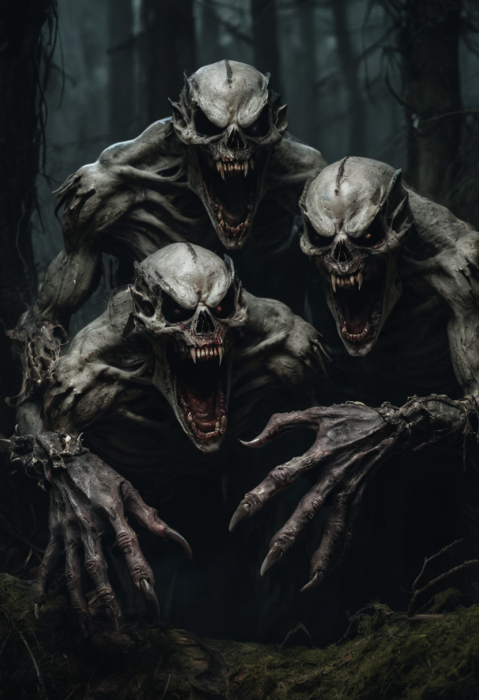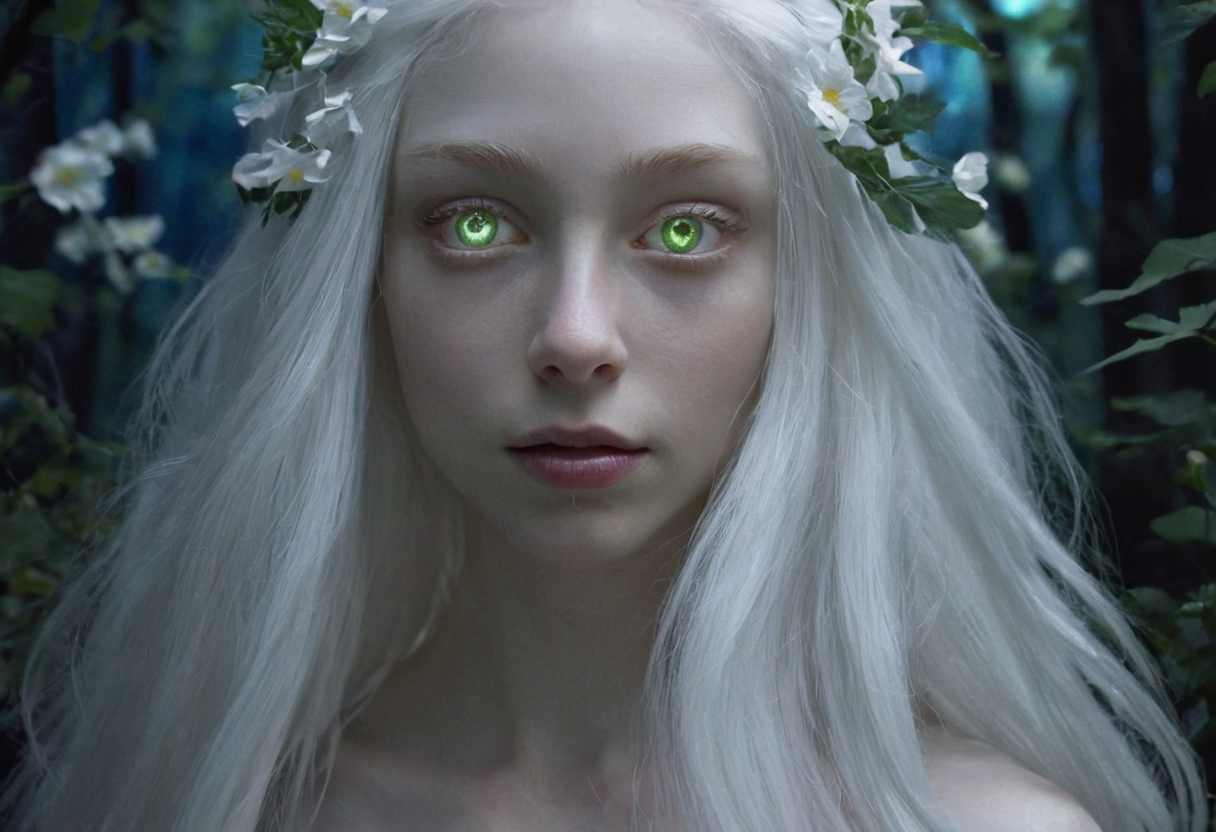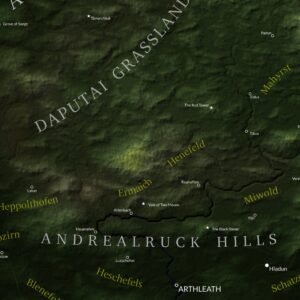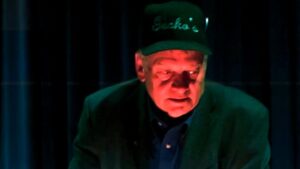Ere even before Thúlornar and her husband, Ghótenór, slept the dreamless sleep, The Onghaor were aware they were being watched from afar. Beings of light, tall creatures with angular features, observed them whenever they neared the forest. It is said that sometimes these beings even visited their encampments when The Onghaor were asleep, for they left behind their long footprints.
It was Ghótenór who named them, for he often wandered on hunting trips near the forest, and many times he claimed to have seen them as he lurked unseen. He called them elfs, which means white beast but also means being of light, for he deemed them stupid and unable to talk, despite looking very much like Men, but with alabaster skin and snow-white hair.
Table of Contents
The Wolf People
Generations passed and the Onghaor wandered farther and farther afield, even sometimes returning to their old hunting grounds whence they left their old tribe. They had mostly forgotten the wisdom of Thúlornar and her husband, Ghótenór, and only The Wise amongst them remembered Nútrúl and his dream.
Oftimes they encounter others on their wanderings, people and other tribes, and sometimes they met under parley and festivity, marrying daughters to sons and sons to daughters , and sometimes they met under war. It was during one of these times of war, when Wúrnúr, which means good man, the great great great grandson of Thúlornar and her husband, Ghótenór, came to prominence.
The Onghaor were hard pressed against the Rórúróúr, which means dog or wolf people. The Rórúróúr were much more populous, and their warriors well led. And the Onghaor were forced to flee, heading back northward towards the forest. But always the Rórúróúr nipped at their heels. Almost all the way to the forest they fled until Wúrnúr conceived a trap for the pursuers.
He and a handful of warriors waylaid their hunters, laying false trails and leading them away from the fleeing tribe. Yet the Rórúróúr were clever, and they managed to ambush the ambushers and all but Wúrnúr were slain one by one.
The Rórúróúr pursued Wúrnúr too but he had the greater wildcraft and so they could not find him and he knew how to sneak past their sentries and pass without leaving any sign, and so it was that he eluded them, even though he had to travel far and knew not where the Onghaor had fled.
For weeks he travelled, until the snow fell and the plains were turned white, and he lived off berries and fruits, grubs and other fell creatures, for he dared not kill any animal lest the Rórúróúr see the signs of its slaughter and know he was nearby.
The Forest
His trail led him northward until eventually he saw the forest, a sight he had not seen since his youth, but which featured heavily in the tales told by his grandfather. And he wondered at its immensity and desired to explore its unseen depths, despite it being dark and foreboding.
Wúrnúr moved in amongst the trees, and only just in time too, for he spied several Rórúróúr warriors running across the plains following his trail. In he plunged to the forest, with its many broken branches strewn across his path, and deep leaf litter impeding him. Into the deep gloom that surrounded the trees, for the sunlight barely reached the upper branches, the foliage was so thick, and not at all near the ground.
Wúrnúr heard the sound of many animals moving around him, and smelt them when they drew nearer, but they did not come near to him, and if they did he did not see them, for the further he dove into the forest the less light from the plains reached him, until he was thrown into complete blackness, and forced to rely on his other senses.
There in the darkness he began to hear other sounds than the groaning of the great boughs or the scampering of the beasts around him. He began to hear laughter. Sometimes merry, like the raindrops from a sunshower on the first day of Spring, and sometimes malicious, cackling, harsh and evil. For the forest was home to many creatures fair and fell. And there were words exchanged between the laughers, although Wúrnúr could not understand the meanings behind them.
The mocking laughter began to draw louder, and the joyous giggling softer, until all Wúrnúr could hear was the sounds of the evil voices around him. And he grew afraid because he could not see the speakers, nor understand their speech.
The Meeting of Wúrnúr and Choalú
Yet, just as the jeers sounded immediately behind him, a light suddenly flared from ahead. So bright it blinded Wúrnúr for a moment, but soon it faded to a blue-white radiance allowing Wúrnúr to see only the tiny figures of the Fae scampering away in the sudden brilliance.
Wúrnúr was drawn toward the light, and as he moved amongst the wide trees he remembered the stories his grandfather had told him, about Nútrúl’s dream and his forebears, Thúlornar and, her husband, Ghótenór. He realised that the light was the Door to Heaven they had sought.
And there within a ball of glowing light stood a young maiden, tall and fair, naked as a newborn babe. And she perceived Wúrnúr as soon as he appeared, and beckoned him. And he went to her, and she spoke with him, although Wúrnúr could not understand her speech, she made herself clear. That she was being hunted by evil creatures and needed Wúrnúr’ protection. And just as the light faded, the Door to Heaven closing, Wúrnúr saw her hunters appear.

Furies they were, tall but with skin like the dead and talons instead of fingers and fangs instead of teeth. And Wúrnúr gathered the maiden to him, and together they fled before the Furies could spy them.
The Furies were persistent, and most skilled, but Wúrnúr was more careful with his wildcraft, and the maiden was well practised in dweolmercraft, and ever did they elude their pursuit until together they affected their escape from the forest and came to the plains.
And there they rested in a deep gully, hidden by the night. And the maiden pointed to herself and said, “Choalú,” and then she pointed at Wúrnúr. And Wúrnúr replied, with his name, and so Wúrnúr met Choalú.
Through the efforts of Wúrnúr’ fieldcraft and Choalú’s spells, they also escaped the attentions of the Rórúróúr, for there were many still searching for Wúrnúr. And together they returned to the Onghaor, who had found their way to a secret gorge, hidden behind a waterfall where none could find it easily, but it was readily defensible.
Yet there Wúrnúr discovered baleful news. He was the last of the great warriors alive, all the others had sacrificed themselves so that rest of the tribe could escape, for while Wúrnúr’ ruse had drawn off most of the Rórúróúr, it had not dissuaded them all, and the tribe was forced to fight their way out.
But Choalú made herself understood, that she would help the Onghaor rebuild their numbers, for she had been instructed by Jelenonjó herself, and much knowledge about things big and small. And so it was, in that secret retreat, far away from the other tribes, Choalú began to teach and the Onghaor began to learn of a different way to live.
Please note: this version is the late Armen Empire text instead of the one used in the Scroll of Hemalsdour, which was Murgaen. There are many similarities, but a few of the names are different.














1 comments.
[…] This is a continuation of The Scroll of Decular. […]